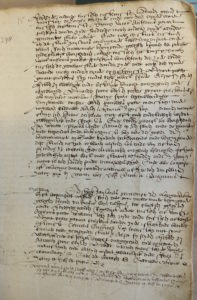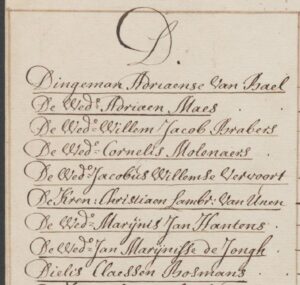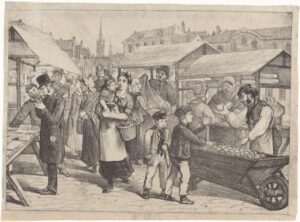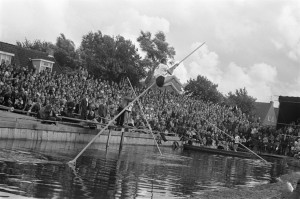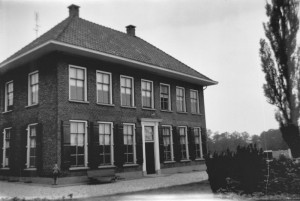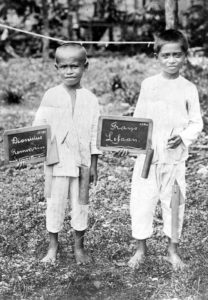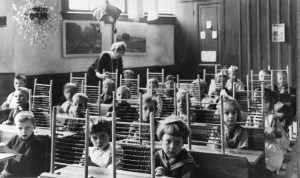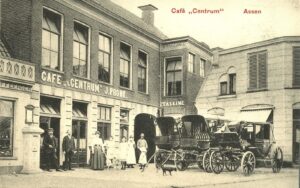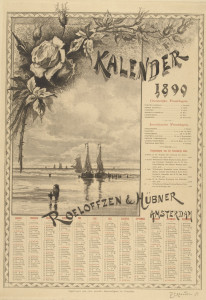The Dutch word transport can simply mean transport, but in legal records it means the transfer of property. Deeds of sale are sometimes called transportakten [transport deeds] or are recorded in transportregisters [transport registers]. Transport deeds will mention the previous and new owners, any rights or encumbrances attached to the property (like tithes, right of way), and a description of its location. … [Read more...]
Quirks of Contemporary Indexes
If you're going through tax records or court records, you might get lucky and find a contemporary (hand-written) index in the front or the back. These indexes may have some quirks: They may be by first name, not last name. This particularly occurs in regions where people did not all use hereditary surnames but used patronymics or farm names. They may be grouped by the first letter only, not strictly alphabetical. Within each letter, the entries would then be in page order. So Andries on … [Read more...]
Dutch term – Koper
A koper is a buyer. You can find the term in land records, such as deeds to purchase a house or in notarial or court records for estate sales. The term is also used in occupations, such as wijnkoper (wine buyer; wine merchant) or houtkoper (wood buyer; wood trader). As an adjective, koper means copper. You may encounter it in some estate inventories that include copper items in the house. … [Read more...]
Quick tip – Jump the pond
If you are trying the find the origins of an immigrant ancestor, don't be afraid to jump the pond and start research in the place of origin if you get stuck. Researching the person in the place you know they lived (after immigration) is a good strategy to start your research into an immigrant ancestor. That may give you clues about their place of origin, their relatives, and their social network. But sometimes, even the most detailed research in a place of destination does not reveal … [Read more...]
Dutch term – Geërfde
In the eastern parts of the Netherlands, a geërfde was a heritor, the owner of a property with certain rights in the commons. The heritors of a district would come together periodically to discuss matters relating to the commons. The geërfde would have a vote in any decisions made there, for example relating to the sale of common land, taxation, allocating funds for road repairs, and other matters involving the community. The records of such meetings can provide interesting insights into the … [Read more...]
“You’re Welcome!”
When I was eleven years old, my mom and I went to the United States to visit her aunt and uncle in Washington, DC. It was my first time on an airplane, and my first time using English for real. I had been learning English for over a year, but had not had the opportunity for an actual conversation. We met our cousins, and some brought gifts for me. When I thanked them, they said "You're welcome." I felt all warm and fuzzy. How nice that these Americans were welcoming me to their country! And … [Read more...]
Dutch term – Roepnaam
A roepnaam is a call name. Roepnamen were often derivatives of the official name. For example, these were the call names of my grandparents: Hendrik Hoitink, known as Henk Gesiena Wilhelmina Woordes, known as Mien, a diminutive of Wilhelmina. Johannes Marijnissen, known as Jan. Catharina Flooren, known as Toos. Catharina was shortened to Cato, which became Toos (pronounced "toes") in some southern parts of the Netherlands. … [Read more...]
Tip: Netherlands genealogy webinars at FamilySearch
Next Wednesday, on 10 November 2021, FamilySearch will host three free webinars about genealogy in the Netherlands: Netherlands Censuses and Population Registers (intermediate) Netherlands Notarial Records (Advanced) Netherlands Archive Spotlight: Friesland (Intermediate). See the FamilySearch list of upcoming webinars for times and registration links. … [Read more...]
Dutch Genealogy News for October 2021
This is an overview of the new website projects, and other news announced last month. Sources An index of the business files of the Chamber of Commerce of Drenthe 1922-1980 can be consulted at the Drents Archief website. The records show which businesses existed in Drenthe. Only businesses that no longer exist are included in the index. The records themselves are not digitized and can be consulted in the reading room. The Drents Archief also published an index of the Assen verdicts … [Read more...]
Quick tip – Dutch Dates are day-month-year
In the Netherlands, and many other countries, dates are written day-month-year. So 3-11-2021 is 3 November 2021, not March 11. Many original records spell out the month to avoid confusion, but you may encounter dates with numbers for the month in genealogical publications. … [Read more...]
